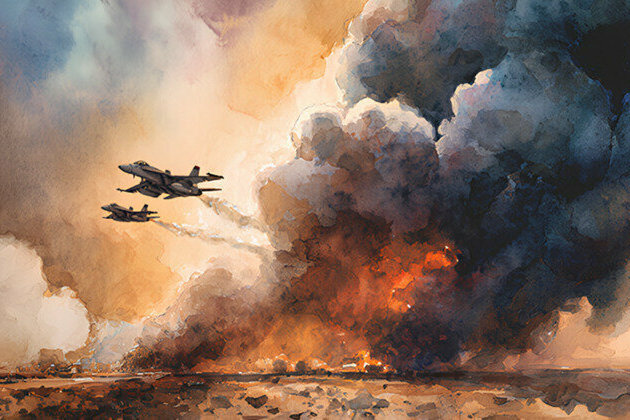Forget Middle East: This region could be next to see a major crisis
RT.com
27 Jun 2025, 16:31 GMT+10

Russia must watch the fallout of Israels wars especially in its backyard
The war in the Middle East poses a growing threat to Central Asia. If Iran undergoes a radical change in its political system or descends into internal turmoil, its territory could become a conduit for foreign infiltration into a region long seen as within Russia's strategic orbit.
Anyone with a grasp of international affairs understands that Russia's most defining geopolitical feature is the absence of natural borders. Even where physical barriers exist, such as in the Caucasus, historical experience has taught Russians to treat them as illusory. In this context, central Asia has always been viewed as part of Russia's extended strategic space. Threats to the region's stability are thus perceived in Moscow not as distant disruptions, but as direct national security concerns. One of the central foreign policy challenges for Russia in the coming years will be determining how far it must go to prevent such threats from materializing.
For the first time since gaining independence in the 1990s, Central Asia may now be seriously vulnerable to destabilizing forces. Geographically removed from the conflict-prone neighborhoods of Turkey, Syria, Iraq, and Israel, the region has enjoyed a period of relative calm. Only Mongolia, bordered by friendly Russia and China, is arguably more fortunate. Central Asia, until now, has been largely insulated. But this insulation is now under threat.
Since the late 19th century, Afghanistan has been the primary concern. But the danger has rarely come from Afghan state actors. Instead, the country has served as a base for extremists targeting neighboring post-Soviet republics. Both Russia and China have long had a vested interest in shielding the region from such spillover, largely for their own domestic reasons. Both powers have large Muslim populations and strong incentives to keep Islamist radicalism at bay. It is precisely this self-interest that has formed the basis of effective cooperation and restraint in international relations.
However, this relatively stable picture is beginning to change. Israel's current posture - driven by an elite seeking to maintain power through perpetual military confrontation - is creating ripple effects far beyond its borders. The escalation since October 2023 has triggered a direct conflict between Israel and Iran. There is even talk in some Israeli circles of targeting Turkey next, due to its regional ambitions. While many of Israel's Arab neighbors may prefer to stay out of such a spiral, the intensification of conflict makes neutrality increasingly untenable.
This trajectory has implications not only for the Middle East, but for the wider Eurasian space. The possibility that Iran could be destabilized - either through external pressure or internal collapse - should concern all those who value regional stability. Iran is a key player in the Eurasian balance, and a descent into chaos could turn it into a launch pad for foreign interference aimed at Russia and China via Central Asia.
Russia must therefore prepare for all scenarios. So far, Iran has shown resilience. The leadership is maintaining control, and the population remains broadly patriotic. But dramatic changes cannot be ruled out. Should Iran fracture, the security vacuum created could expose Central Asia to manipulation from actors who view the region not as a priority in itself, but as a lever against Moscow and Beijing.
It bears emphasizing: Central Asia is not significant to the West in the way it is to Russia or China. The region's population of under 90 million is dwarfed by the likes of Iran or Pakistan. Its global economic footprint pales in comparison to Southeast Asian nations such as Vietnam or Indonesia. The West views it not as a partner, but as a resource base - useful insofar as it weakens Russia and China.
Should Iran descend into disorder, foreign actors could use it as a staging ground to project influence or destabilize Central Asia, without facing any real consequences themselves. For Washington, Brussels, or London, events in the region are an abstraction - something to exploit diplomatically, not something to defend materially.
Beyond the external threats, there are internal risks as well. Israel's aggressive foreign policy, when broadcast globally, generates resentment among Muslim populations. In Central Asia, where ties to Russian culture and the Soviet past are strong, many citizens have a finely tuned sense of justice. They are not passive observers. Perceived injustice in the Middle East could radicalize sections of the population, making them susceptible to extremist messaging.
The governments of Central Asia have done much to avoid becoming pawns in global geopolitics. The creation of the 'Central Asian Five' - a regional platform for dialogue and coordination - has been a major step. Russia supports this initiative, recognizing the importance of local agency and regional cooperation.
These states are wisely building stronger relations with key neighbors, including China and Russia, while maintaining a cautious stance towards Turkey's neo-Ottoman ambitions. Ankara's push for a 'Great Turan' is treated with polite skepticism. Its economic and military capacities remain limited, and Central Asian leaders understand that.
Overall, the region's foreign policy is marked by pragmatism. It seeks flexibility without compromising core obligations to strategic partners such as Russia. Moscow has no reason to take offence. And yet, even the best foreign policy cannot insulate these states from chaos beyond their borders.
Russia must be realistic. It cannot - and should not - assume total responsibility for defending Central Asia. History teaches caution. The First World War stands as a cautionary tale of Russia committing to allies at great cost, only to reap instability and collapse. Moscow should now make clear that the preservation of sovereignty in Central Asia is a matter for the region's governments themselves. Russia remains a friend, a neighbor, and a responsible partner. But it will not mortgage its future for vague promises or ill-defined obligations.
In the age of collapsing norms and rising brute force, this sober, balanced approach is the only one that can ensure both regional peace and Russia's own long-term security.
This article was first published byVzglyadnewspaper and was translated and edited by the RT team.
(RT.com)
 Share
Share
 Tweet
Tweet
 Share
Share
 Flip
Flip
 Email
Email
Watch latest videos
Subscribe and Follow
Get a daily dose of Malaysia Sun news through our daily email, its complimentary and keeps you fully up to date with world and business news as well.
News RELEASES
Publish news of your business, community or sports group, personnel appointments, major event and more by submitting a news release to Malaysia Sun.
More InformationSoutheast Asia
SectionThailand-Cambodia tensions rise as border rules tighten
BANGKOK, Thailand: This week, Thailand implemented land border restrictions, including a ban on tourists traveling to Cambodia, as...
Leaked call pushes Thai govt to the brink as allies waver
BANGKOK, Thailand: Thailand's government is facing its biggest crisis in nearly a year, as Prime Minister Paetongtarn Shinawatra's...
Forget Middle East: This region could be next to see a major crisis
Russia must watch the fallout of Israels wars especially in its backyard The war in the Middle East poses a growing threat to Central...
From bunker bombs to Nobel dreams: Trumps war for peace
Choosing a military solution over a negotiated one in dealing with Iran is is a throwback to US unilateralism and regime change policies...
BLA claims killing six Pakistan Army personnel in Balochistan clashes
Quetta [Pakistan], June 27 (ANI): The Baloch Liberation Army (BLA) has claimed responsibility for killing six Pakistan Army personnel...
National Muay Thai Team secures 16 medals, tops men's category at Asian Championship
HANOI, 27th June, 2025 (WAM) -- The National Muay Thai Team has achieved an outstanding total of 16 medals and clinched first place...
Business
SectionRent freeze fears hit NYC banks, landlords as Mamdani leads
NEW YORK CITY, New York: New York City's financial markets reacted sharply this week as shares of local banks and real estate investment...
Starbucks refutes media report on plans to exit China
SEATTLE, Washington: U.S. coffee company Starbucks has said it is not planning to sell all of its business in China, even though a...
U.S. markets surge, Dow Jones jumps 404 points
NEW YORK, New York - U.S. stocks surged on Thursday, with Wall Street's major indexes climbing nearly 1 percent as investor optimism...
Job board pioneers CareerBuilder, Monster face bankruptcy
NEW YORK, U.S.: Two giants of the early internet job search era—CareerBuilder and Monster—have formally filed for bankruptcy protection,...
Amazon still trails UK grocers on fair supplier treatment
LONDON, U.K.: Amazon has once again been rated the worst major UK grocery retailer by its suppliers when it comes to following fair...
How Chinese vapes reach US stores despite import restrictions
LONDON/NEW YORK/CHICAGO: In suburban Chicago, just 15 minutes from O'Hare International Airport, a small customs brokerage quietly...












